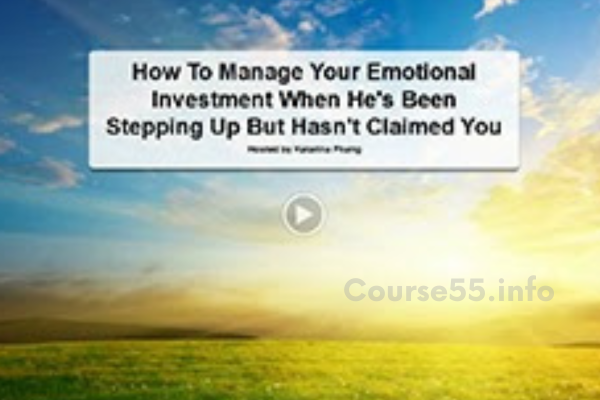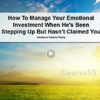-
×
 Tunnel Trading Course (No Software) with Joshua Martinez
1 × $101.00
Tunnel Trading Course (No Software) with Joshua Martinez
1 × $101.00 -
×
 Wounds Into Wisdom By Rabbi Dr. Tirzah Firestone
1 × $101.00
Wounds Into Wisdom By Rabbi Dr. Tirzah Firestone
1 × $101.00
How to Manage Your Emotional Investment When He’s Been Stepping Up but Hasn’t Claimed You by Katarina Phang
$107.00 Original price was: $107.00.$23.10Current price is: $23.10.
How to Manage Your Emotional Investment When He’s Been Stepping Up But Hasn’t Claimed You by Katarina Phang – Immediate Download!
Let See The Content Inside This Course:

Description:
An important factor in the complex web of romantic relationships is emotional investment. A flurry of feelings, uncertainty, and vulnerability can result when one partner exhibits commitment but refrains from formally claiming the partnership. This leads us to the insightful lessons of well-known relationship expert Katarina Phang. Phang stresses how crucial it is to prudently manage emotional investments in order to avoid confusion and victimization. Before becoming unduly attached in someone who hasn’t fully committed, her observations advise people—women in particular—to take stock of their emotional ties. This article explores Phang’s teachings in depth and offers helpful guidance for negotiating these difficult emotional terrains as well as doable suggestions to promote more positive romantic relationships.

Understanding Emotional Investment
Emotional investment in relationships is akin to nurturing a delicate plant. You water it, give it sunlight, and provide nourishment, hoping it will grow and flourish. However, if your partner isn’t equally nurturing in this emotional garden, it can lead to a lot of heartache. Phang’s teachings emphasize assessing the reciprocity of emotional investment; understanding that not every gesture of affection equates to a commitment can save you from a lot of frustration.
The Emotional Rollercoaster
It can be emotionally taxing when a partner steps up and shows signs of commitment but doesn’t commit. You may feel exhilarated at one point, enjoying the excitement of new possibilities. Then uncertainty sets in, making you wonder if you’re valuable in that connection. The risks of overinvesting become evident at this point. Phang emphasizes the value of preserving emotional composure, a well-rounded strategy that keeps people rooted.
Practical Steps to Maintain Balance
To avoid the emotional turmoil associated with ambiguous relationships, consider these practical steps inspired by Phang’s teachings:
- Assess the Situation Objectively: Look at your partner’s actions and words. Do they align? If he shows signs of stepping up, but his commitment remains ambiguous, it might be worth stepping back to reevaluate your feelings.
- Set Healthy Boundaries: Ensure that you are not giving away too much emotionally without receiving a similar investment in return. Having boundaries fosters respect and ultimately encourages reciprocity.
- Practice Self-Awareness: Recognize your emotional triggers. Are you emotionally available, or do you find yourself chasing after unavailable partners? Knowing this about yourself is the first step toward change.
- Focus on Personal Growth: Instead of solely investing in the relationship, channel your emotional energy into hobbies, friendships, and self-care. This will not only enhance your self-esteem but also create a more prominent sense of self, independent of your relationship status.
Navigating a Relationship with an Unavailable Partner
It’s not uncommon to find oneself deeply attracted to someone who displays characteristics of emotional unavailability. According to Karim M. Ahmed, an expert in emotional intelligence, the desire for connection can sometimes cloud judgment, leading one to overlook red flags.
Recognizing Patterns of Unavailability
For many women, the pursuit of emotionally unavailable partners often stems from a pattern of seeking validation. Research shows that 62% of individuals pursuing a relationship with an unavailable partner do so to fill a void in their emotional landscape. Recognizing these patterns is imperative in taking proactive steps towards healthier emotional investments.
Transitioning Mindsets
Phang encourages women to adopt a perspective shift when dealing with such partners. Instead of viewing oneself as a victim of unreciprocated feelings, approaching the situation with a mindset of empowerment can be transformative. This means:
- Acknowledging your own worth and not tying it to the attention received from a partner.
- Regularly checking in with your feelings and adjusting expectations accordingly.
- Creating a dialogue within yourself that focuses on self-compassion rather than self-recrimination.
Building Resilience
Building emotional resilience involves embracing imperfection and uncertainty. Using tools such as mindfulness and meditation can help individuals remain centered. Phang recommends practices like journaling or discussing your feelings with trusted friends or therapists to better understand your emotional landscape.
Finding Balance in Emotional Investments
In a world that often glorifies romantic escapades, balancing emotional investments becomes essential for personal well-being. Phang’s teachings facilitate a balanced approach, empowering women to navigate these emotional waters with grace.
The Importance of Emotional Receptiveness
A critical aspect of managing emotional investments is practicing emotional receptiveness. This means allowing oneself to be open to the ebb and flow of emotions without losing sight of one’s values and boundaries. Phang offers strategies such as:
- Being Present: Focus on the current moment rather than obsessing over future outcomes. By savoring the present, you maintain emotional balance.
- Communicating Needs: Explicitly stating your emotional needs fosters a culture of communication that can clarify intentions and expectations.
- Recognizing Personal Value: Constantly remind yourself of your worth, irrespective of someone else’s commitment.
Evaluating Relationship Dynamics
Reflect on the dynamics of your romantic relationship. Are you thriving on mutual respect, or are you seeking validation from an elusive partner? This self-assessment can serve as a compass for directing your emotional investments wisely.
| Emotional Investment | Signs of Healthy Partnership | Red Flags |
| Shared Goals | Both invest equally | One-sided efforts |
| Open Communication | Regular check-ins | Avoidance of emotional topics |
| Mutual Respect | Encouragement & support | Belittlement or disrespect |
| Emotional Availability | Both partners willing | Withdrawal or emotional distance |
Conclusion
The advice Katarina Phang offers on handling emotional investments is crucial for negotiating the frequently turbulent waters of contemporary relationships. By emphasizing self-awareness, setting up sound boundaries, and engaging in receptiveness exercises, people can develop emotional equilibrium and steer clear of the dangers associated with overinvestment.
In the end, cultivating bonds based on shared interests rather than reliance results in stronger bonds and a greater sense of self-worth. The route to better, healthier relationships is illuminated by Phang’s teachings, which are a beacon in today’s society when emotional dynamics can be complicated and frequently perplexing. Keep in mind that both your sentiments and your desire for a satisfying relationship are legitimate as you travel through your emotional journey. Keep your heart safe, make sensible investments, and remember that you deserve a relationship in which your emotional investment is genuinely returned.
Frequently Requested Enquiries:
Innovation in Business Models: We employ a group buying strategy that allows customers to divide costs and receive a lower rate for popular courses. Despite content providers’ concerns about distribution tactics, this approach benefits low-income individuals.
Legal Aspects: The legality of our conduct raises a number of complex issues. Although we do not have the course developer’s official permission to redistribute their content, there are no clear resale restrictions stated at the time of purchase. We have the opportunity to provide affordable educational resources because of this uncertainty.
Quality Control: We ensure that all of the course materials we purchase are identical to those supplied by the writers. However, it is important to understand that we are not approved vendors. Consequently, our products don’t include:
– In-person consultations or phone conversations with the course developer for advice.
– Access to sites or organizations that are exclusive to authors.
– Engaging in private forums.
– Simple email support from the author or their team.
By offering these courses independently, without the premium services of the official channels, we hope to reduce the barrier to education. We appreciate your understanding of our unique approach.
Be the first to review “How to Manage Your Emotional Investment When He’s Been Stepping Up but Hasn’t Claimed You by Katarina Phang” Cancel reply
You must be logged in to post a review.

















Reviews
There are no reviews yet.